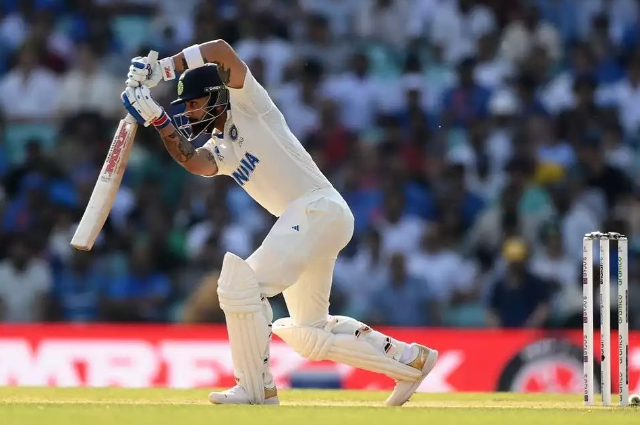I didn’t grow up glued to cricket matches. I didn’t count runs or stay up late waiting to find out who won. To me, Virat Kohli was just another name—echoing through crowded tea stalls, staring back from magazine covers, blaring through television screens, and lingering in casual conversations.
But today, I saw the announcement of his retirement. And it made me pause.
Sometimes, you don’t need to be a fan to feel something. Sometimes, a story finds you—and stays.
His retirement from Test cricket wasn’t just the end of a career. It felt like the closing of a chapter that millions had read—with pride, with frustration, and with admiration. He wasn’t perfect. He had his anger, his aggression, his highs and lows. But isn’t that what makes him human?
The Rise – A Boy with a Bat and a Dream
Long before he became a household name, there was a boy in West Delhi with a bat and an almost feral hunger to prove himself. Virat lost his father when he was just 18, during a Ranji Trophy match. And instead of grieving at home, he chose to play the next day. That wasn’t just cricket. That was grit. That was madness. That was the beginning of a fire that refused to go out.
He wasn’t gifted with privilege. He earned every run with sweat and spirit. His rise through the ranks—from a chubby teenager to the U-19 World Cup-winning captain—wasn’t smooth. But it was relentless.
Becoming the Name Everyone Knew...
With time, he wasn’t just playing cricket. He was defining it.
Virat’s attitude wasn’t always easy to digest. His aggression wasn’t rehearsed—it was raw. Every celebration, every shout, every glare had fire. To some, it was arrogance. To others, it was passion. Either way, you couldn’t ignore him.
He became a run machine. Hundreds came. And so did consistency—something rare in a game as fickle as cricket. When MS Dhoni stepped down, it was Virat who picked up the torch. And he didn’t walk—he roared.
To a generation raised on speed, confidence, and challenge, he was more than a cricketer. He was a reflection.
The Man Behind the Jersey
But behind that fierce exterior, a man was evolving.
The media called him temperamental, too expressive, too angry. And maybe he was. But he grew—he changed. His commitment to fitness wasn’t just personal; it rewired the team culture. Suddenly, fielding wasn’t optional. Energy was contagious. He made the Indian team sharper, quicker, tougher.
And then came Anushka. Their love story wasn’t hidden—it was honest. For a man used to shouting on fields, he learned how to soften. Becoming a father added layers that the world hadn’t seen. His Instagram was no longer just about cricket—it was about life.
The Turning Point – Not Just Statistics
Even the brightest flames flicker.
Form dipped. Opinions flew. Social media became harsher. The same mouths that once praised began to spit doubts.
But what he did next wasn’t dramatic. It was dignified.
He stepped down as captain. Then came the news: retirement from Test cricket.
He didn’t wait for the BCCI to nudge him out. He walked on his terms. That’s the thing about people who burn with pride—they’d rather leave with grace than be asked to go.
And maybe, in a way, that was his most powerful statement.
Reflection – What He Leaves Behind?
It’s hard not to feel a little heavy-hearted seeing Virat Kohli step away, especially when you think of how brightly he once burned on the field. Maybe it’s age, maybe it’s the weight of expectations, or the years of carrying a billion hopes. Maybe it’s the quiet exhaustion that builds up when the cheers start to fade and the pressure never does. He switched between formats, faced criticism, lost form, and perhaps—somewhere along the way—lost the joy too. And yet, even in this quieter ending, his journey feels full. Not because of how it ended, but because of how deeply it was lived.
Is a player’s worth measured only by current scores, or by what they’ve done for the team over the years? Everyone has slumps. Should icons be given support to bounce back or be replaced by rising talent? Should institutions craft graceful exits for players who served the nation? Or is the game too ruthless for sentiment? I would leave all these questions to you..
But one thing is clear: "Young talent must rise, but legends must not be erased like they never existed."
What we learn from Kohli’s story is that even the strongest need space to breathe, to fall, and to find their way back, without being judged. Success doesn’t shield anyone forever, and pressure can weigh down even those who once looked unshakable. His journey reminds us that greatness isn’t just in numbers, but in the fire, the fight, and the honesty with which one lives. It teaches us to treat people with more empathy, to value effort as much as outcome, and to remember that behind every icon is a human who deserves dignity, even when the spotlight dims.
When a player retires, they leave numbers. Kohli left more.
He left behind intensity, on and off the field.
He left behind a culture of fitness and fearless cricket.
He left behind memories of countless chases, verbal spats, heroic stands, and eyes that refused to blink under pressure.
His legacy is not spotless. But it is bold. And real. And unforgettable.
Closure – The Story Found Me
I wasn’t there for the beginnings. I didn’t live through every match. But somehow, when I watched the announcement of his retirement, it felt like I was losing something too.
That’s what powerful stories do. They find you, even if you weren’t looking.
Virat Kohli wasn’t just a cricketer. He was a chapter written in sweat, roars, heartbreaks, and courage. And now that it’s ended, I realize… I had been reading along, after all.

